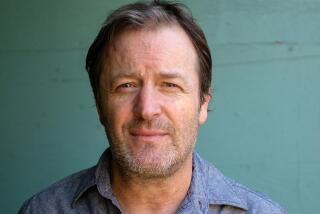‘Horse People’ Suffer Death in the Family
- Share via
David Wheatley sat back, doffed his worn gray cowboy hat and let out a loud hoot.
“Did you see that? Did you see what they did?” he asked the other riders in the truck. “That was a once-in-a-lifetime, boys. My heart is still pumping.”
He sat back, smiling and exhausted. It had been a rough week. For five days, Wheatley had repeated a grueling trek to a remote ravine tucked in some of the roughest terrain of the San Gorgonio Mountains. His mission: to bring food and water to his injured horse, Scotch, who had been trapped there after a nasty fall.
It happened one Sunday evening as Wheatley and his father were making their way down a tricky horse trail. The two were heading home after a day of helping search for a lost 12-year-old Boy Scout when the mare misjudged her footing, flipped, and “looked like a basketball” during an 800- to 1,000-foot slide down the canyon side. Wheatley somehow survived the fall unhurt.
As a reporter for The Times, I had gone there to cover the rescue of the horse, while most of my colleagues focused on the larger, more important story: the search for the missing Scout.
As it turned out, Wheatley’s father, Joseph, had used his military experience and knack for tenacious lobbying to persuade Marines at the Tustin air base to help rescue Scotch. A chopper crew had navigated a CH-46 Sea Knight, the double-rotor type used for transporting tanks and troops, into the ravine just before 3 p.m. The huge chopper was only 40 feet above the ground and less than 10 feet away from the canyon wall as Wheatley and five others strapped a doped and dazed Scotch into the harness.
Now, after the rope climb out of the ravine and a 30-minute hike to his brother’s orange Blazer, Wheatley and his companions were awash with relief and giddy as they relived their adventure. They laughed when remembering the slapstick appearance of six men negotiating a drugged horse into a harness amid a rotor-driven windstorm, and then their voices softened when someone mentioned Scotch’s injuries.
“She’ll be OK,” Wheatley said. “She made it through all this, didn’t she?”
“Everybody said, ‘No, there’s no way to get her out,’ ” Wheatley’s brother Mike said as the Marines prepared to airlift the horse out. “ ‘There’s no way she’ll live; just put her down,’ they all said. But we’re horse people, and we’re not going to let her die if we don’t have to.”
“Horse people” is a term the Wheatley family uses when they talk about themselves. More than a reference to horse ownership, it is a philosophy to them, an understanding of nature and a desire to interact with it. It means doing right by people and animals, and sometimes it means doing things the hard way, if necessary.
The Blazer was noisy with plans as Wheatley and the others neared the point where they were to link up with Scotch. First, Scotch would be taken home and get a thorough going-over by a veterinarian. Then the Wheatleys were going to get in touch with that chopper crew: After their spectacular performance, they had to be there for the homecoming party.
But Scotch never made it home. More than halfway down the mountain, Wheatley’s wife intercepted the Blazer with the news--somehow, the horse had slipped through the harness and plunged to the ground. The fall was more than 2,000 feet; this time there would be no miraculous survival.
Stunned, David Wheatley again removed his hat and ran his fingers through his hair. His face reflected his frustration and disappointment, and he spoke in a halting voice. “Oh, this changes everything. This changes everything.”
Wheatley and his family aired no regrets, no words of blame, nor talk of wasted efforts. Instead, they could be proud of their attempt and thankful for the help they got.
Instead of dying alone at the bottom of a ravine of starvation or her wounds, Scotch died with no pain, they believed. Maybe the end result is the same, but for the Wheatleys, doing it the hard way was worth it. They are, after all, horse people.
More to Read
Sign up for Essential California
The most important California stories and recommendations in your inbox every morning.
You may occasionally receive promotional content from the Los Angeles Times.













